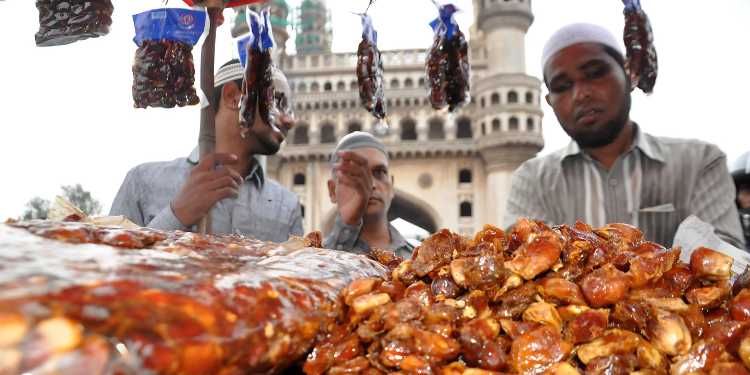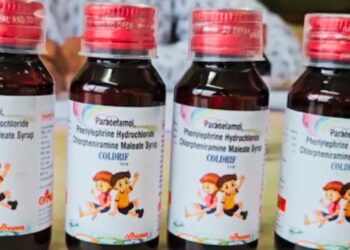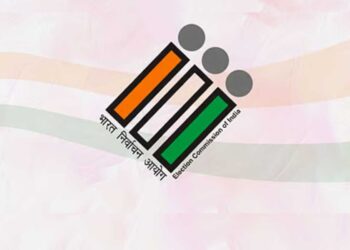Ramadan Dates Market in Hyderabad experiences a significant rise in demand every year. As the holy month approaches, Muslims worldwide make preparations for fasting, prayers, and iftar meals. Among the essential elements of iftar, dates hold special significance.
Islamic traditions emphasize breaking fast with dates, a practice encouraged by Prophet Muhammad (PBUH). Dates provide instant energy and are packed with essential nutrients, including vitamins, minerals, and fiber, making them an ideal food to break the fast.
Hyderabad’s Dates Market Sees a Boom
In Hyderabad, the Ramadan Dates Market witnesses a substantial increase in trade. Dates are imported from various Arab nations, including Saudi Arabia, Iraq, Jordan, and Algeria. Iranian dates are also in high demand.
Begum Bazaar, Hyderabad’s largest wholesale market for dates, offers a variety of options such as Ajwa, Khudri, Medjool, Amber, Sukkary, Sagai, Mabroom, Sattari, Barni, Safawi, Zahedi, Rabbi, and more. However, the most popular variety remains Pind dates due to their affordability.
During Ramadan, special stalls and markets are set up to cater to the growing demand, attracting thousands of buyers.
Demand and Consumption of Dates During Ramadan
On average, a household consumes around 7-8 kg of dates throughout Ramadan. The rising demand slightly impacts prices, but most varieties remain stable. Dates are also used in Eid delicacies like Sheer Khurma, further driving demand.
Insights from Wholesale Dealers
Hyderabad’s Begum Bazaar is known as the prime hub for wholesale dates. Raj Kumar, a prominent dealer from Kashmir House, noted that Ramadan brings an annual surge in demand, prompting wholesalers to stock up months in advance.
The most sought-after variety remains Iranian dates. Raj Kumar revealed that preparations for Ramadan begin two to three months ahead to meet the market’s needs.
Radhe Shyam, proprietor of Tara Dry Fruits, confirmed that not only dates but also dry fruits see an increase in sales during Ramadan. Prices see a minor rise, but it remains affordable for most buyers.
Small Traders and Local Vendors
While Hyderabad’s old city remains the focal point of Ramadan festivities, areas like Mallepally also witness a thriving trade in dates. Small vendors set up carts near mosques and busy streets, selling various types of dates.
Azharuddin, a vendor near Mallepally’s Badi Masjid, shared insights about his business. During regular months, he sells around 5-10 kg of dates daily, but during Ramadan, the volume increases to 25-30 kg per day. He noted that Pind dates are the most popular among the lower and middle-income groups due to their affordability.
Other sought-after varieties include Zahedi and Barni, known for their reasonable pricing and good taste. Middle-class consumers prefer Iranian dates under brands like Kimia due to their balanced pricing and quality. Tunisian and Algerian dates are also popular.
Premium varieties like Medjool, Ajwa, and Amber from Saudi Arabia and Jordan see a rise in demand among wealthier buyers. However, Azharuddin warned about the surge in counterfeit and low-quality dates during Ramadan, with some traders selling old stock disguised as fresh imports.
Supermarkets vs. Local Markets: Where Do Consumers Prefer Buying Dates?
Supermarkets attract customers with Ramadan-specific offers and discounts. However, local traders set up special stalls for dates, drawing a significant portion of consumers.
Many middle-class and lower-income buyers prefer local markets due to personal relationships with sellers and better customer service. Unlike supermarkets, where bulk purchasing is often necessary, local markets allow small and flexible purchases. Additionally, quality concerns in supermarkets deter some buyers, as returning a defective product can be cumbersome.
Boycott of Israeli Dates During Ramadan
For the past two decades, a global movement to boycott Israeli dates during Ramadan has gained momentum. Muslims worldwide avoid purchasing dates sourced from Israel, impacting brands like King Solomon, which previously had a strong market presence.
Despite this, Israel continues selling its dates under alternative brand names. Investigations revealed that brands like Jordan River, Jordan River Bio Top, and Medjool (My Jul) are Israeli products found in supermarkets. Vendors like Azharuddin confirmed that Israeli dates still enter the market under different labels.
A Market That Grows with Ramadan’s Spirit
The Ramadan Dates Market plays a crucial role in both religious observance and commercial activity. With increasing demand each year, wholesale dealers, small traders, and consumers navigate the changing market trends. Price fluctuations, quality concerns, and ethical considerations such as the Israeli date boycott influence consumer choices.
This analysis of Ramadan Dates Market offers valuable insights for traders, vendors, and buyers, helping them make informed decisions while continuing the cherished tradition of breaking fast with dates during Ramadan.


















